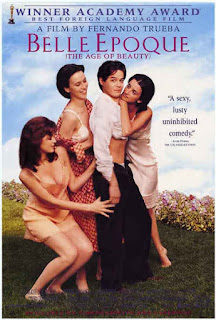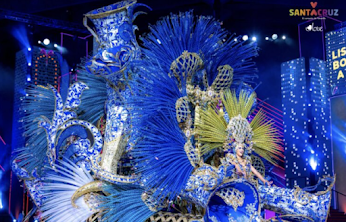BELLE EPOQUE, FILM. FRIDAY OCTOBER 9TH, 7.30PM.
A French name, but a very Spanish film. Director Fernando Trueba named his movie after the French Belle Epoque of the end of the nineteenth century, but this is set in Spain’s own Age of Beauty, between the First World War and the Spanish Civil War, in 1931.
Trueba said about his filmmaking, “I like to hear the audience laughing in a dark theatre.” And that is what this film is designed to do, make people laugh, it is a feel-good film in the best sense of the word. Joyous and uplifting, the film’s themes are pleasure, love and music. It won the Best Foreign Film Oscar in 1993, and it is easy to see why.
The setting is rural Spain. Fernando (Jorge Sanz), whose allegiance is to the Republic, deserts from the monarchist army and goes on the run into the Spanish countryside. There he meets Manolo (Fernando Fernán Gómez), a painter who shares his political beliefs. Fernando stays in Manolo’s house for the night and is about to go on his way until he meets Manolo’s four beautiful daughters.
And this is where the fun begins. Critic James Berardinelli, on reelnews.net, described the film as “an enchanting, unpretentious, two-hour vacation from the rigors of real life.” It is hard to disagree.
The film will be shown in the Yeats Building, Sligo, at 7.30pm on Friday October 9th. Admission is €5 or €3 for students or the unemployed. Wine and tapas reception afterwards included in the price.
|
Título francés,
pero una película muy española. La película lleva el nombre de la belle epoque francesa, a finales del siglo
diecinueve, pero esta película está ambientada en la bella época española, entre la primera guerra mundial y la Guerra
Civil, en 1931.
El director Fernando
Trueba dijo de sus películas, “me gusta oír el público riéndose en un cine
oscuro”. Y es eso el objetivo de esa peli, hacer que la gente se ría. Es una película
ligera y divertida pero de mucha calidad. Alegre y edificante, los temas de la
peli son el placer, el amor y la música. Ganó el premio de Mejor Película de
Lengua Extranjera en los Oscars de 1993, y es fácil ver por qué.
España rural,
1931. Fernando (Jorge Sanz), chico republicano, desierta del ejército nacional
y huye al campo. Ahí conoce a Manolo (Fernando Fernán Gómez), un pintor que
comparte sus creencias políticas. Fernando se queda una noche en la casa de
Manolo y está al punto de seguir con su viaje cuando conoce a las cuatro bellas
hijas de Manolo.
Es ahora que
empieza la diversión. Crítico James Berardinelli, (reelnews.net), describe la
película como “un descanso encantador y sin pretensiones de las dificultades
de la vida real.” Es una opinión difícil de contrariar.
Mostraremos esta
película en el Yeats Building, Sligo, a las 7.30 de la tarde, viernes el 9 de
octubre. Entradas cuestan €5 o €3 para estudiantes o parados. Vino y tapas después
de la película incluidos en el precio.
|




Comments
Post a Comment